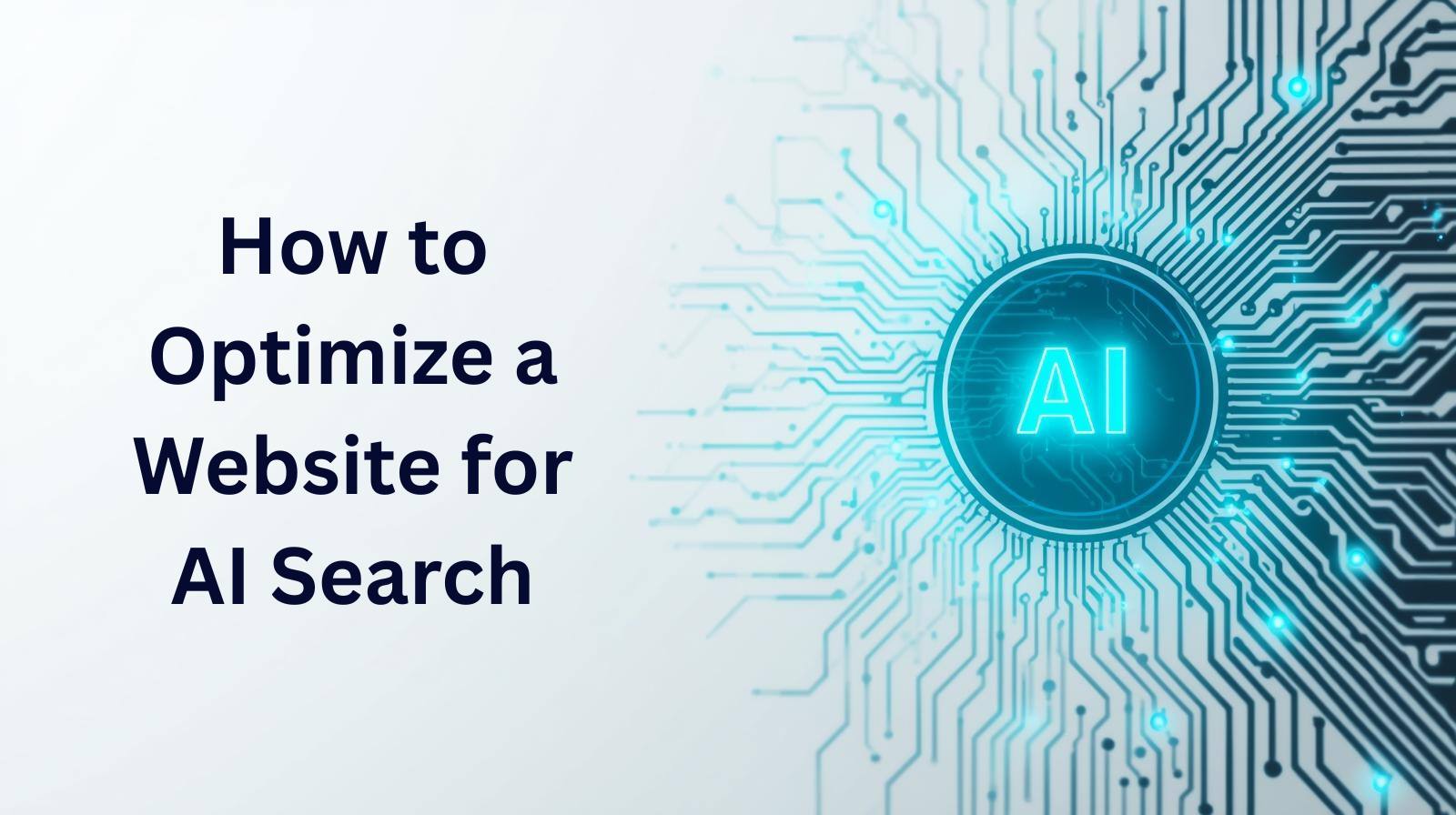
How to Optimize a Website for AI Search
Search is changing faster than ever. With the rise of AI-powered search tools like Google’s Search Generative Experience (SGE), Bing Copilot, and ChatGPT’s web browsing, the way people discover information online is evolving dramatically.
Instead of scanning pages of blue links, users now ask natural questions and get AI-generated answers — often summarizing the best content from multiple sources.
So, the question for every business owner, marketer, and website manager is this:
👉 How do you make sure your website is visible, relevant, and chosen by AI as a trusted source?
Here’s your complete guide to optimizing your website for AI search in 2025 and beyond.
1️⃣ Understand How AI Search Works
AI search engines don’t just match keywords — they interpret meaning, intent, and relationships between topics. They use natural language processing (NLP) to understand context and pull together useful, conversational answers.
To be “AI-search ready,” your website content needs to:
Address real questions users ask.
Be easy for AI to read and understand.
Show expertise and credibility.
Think beyond “ranking” — think about how AI would summarise your website to a user.
2️⃣ Write Conversational, Intent-Focused Content
Traditional SEO relied heavily on keywords. AI search focuses on intent and relevance.
That means your content should sound like it’s talking to a person, not an algorithm.
✅ Tips:
Write in a natural, conversational tone.
Include questions and answers within your content (great for featured snippets).
Cover topics comprehensively — not just surface-level.
Use headings like “What,” “Why,” and “How” to mirror real queries.
Example:
Instead of writing “boiler repair London,” use:
“Need a quick boiler repair in London? Here’s what to check before calling an engineer.”
This approach feels human — and that’s exactly what AI understands best.
3️⃣ Use Structured Data (Schema Markup)
AI systems rely on structured data to make sense of web pages. Schema markup tells search engines exactly what your page is about — from products and reviews to FAQs and business details.
✅ Add schema for:
FAQ pages (FAQ schema)
Local services (LocalBusiness schema)
Blogs and articles (Article schema)
Products and reviews (Product schema)
This helps AI systems confidently quote or reference your site when answering questions.
4️⃣ Demonstrate E-E-A-T (Experience, Expertise, Authoritativeness, Trustworthiness)
AI search prioritizes credible, expert-driven content. This is part of Google’s E-E-A-T framework — and it’s key to being selected as a trustworthy source.
✅ How to improve your E-E-A-T:
Show authorship — add author bios and credentials.
Link to reliable references and data sources.
Publish case studies, testimonials, and client stories.
Keep your content updated and accurate.
The more clearly your site demonstrates real expertise, the more likely AI is to treat it as a reliable authority.
5️⃣ Improve Technical SEO & User Experience
AI doesn’t just read your content — it measures how users interact with it.
If your website is slow, hard to navigate, or confusing, AI will take that as a signal of poor quality.
✅ Check your technical setup:
Mobile-first design (most AI queries come from mobile).
Fast load times (aim for under 2.5 seconds).
Clear navigation and internal linking.
Readable structure with proper headings (H1, H2, H3).
Google’s Core Web Vitals and Page Experience are still essential — and now more important than ever.
6️⃣ Use Visuals and Multimedia AI Can Understand
AI is learning to interpret images, videos, and even audio — but it still depends on context.
✅ Optimize all media:
Add alt text that describes the image meaningfully.
Use descriptive file names (e.g. “renewable-heating-installation.jpg”).
Include video transcripts and captions.
Compress files for speed.
Rich media increases user engagement and helps AI understand the full scope of your content.
7️⃣ Strengthen Your Brand Presence Across the Web
AI search doesn’t only look at your website. It gathers information from your entire digital footprint — social media, directories, review sites, and mentions.
✅ Ensure consistency:
Keep your Google Business Profile updated.
Maintain consistent Name, Address, Phone (NAP) details.
Encourage and respond to online reviews.
Earn mentions and backlinks from credible sources.
This reinforces your brand’s authority, helping AI identify you as a trusted, verifiable entity.
8️⃣ Target Featured Snippets and AI Summaries
AI search results often include featured snippets and summarized answers — and those are prime real estate.
✅ To win snippets:
Answer key questions clearly in 40–60 words.
Use lists, tables, or step-by-step explanations.
Include FAQs on your pages.
Structure each post around a main question.
When AI tools pull from “position zero,” your content can be featured above competitors — even in conversational results.
9️⃣ Keep Adapting — AI Search Is Still Evolving
AI-driven search is changing daily. Google’s SGE, ChatGPT’s Browse mode, and new tools like Perplexity or You.com are constantly updating how content is discovered and ranked.
✅ Stay proactive:
Monitor how your brand appears in AI summaries.
Keep learning about emerging AI SEO trends.
Update your content regularly to stay relevant.
Experiment with AI-powered SEO tools to identify new opportunities.
In short — don’t optimize once; optimize continuously.
✨ Final Thoughts
AI search is not replacing SEO — it’s elevating it.
The goal is still the same: help users find valuable, trustworthy answers.
But now, you need to think in a way both humans and machines can understand.
In summary:
Write for people, structure for AI.
Show your expertise and build authority.
Keep your brand consistent across platforms.
The future of search belongs to websites that combine clarity, credibility, and context — and those who adapt early will stay visible in an AI-first world.
